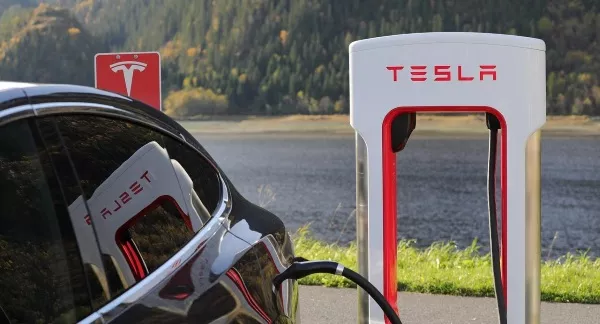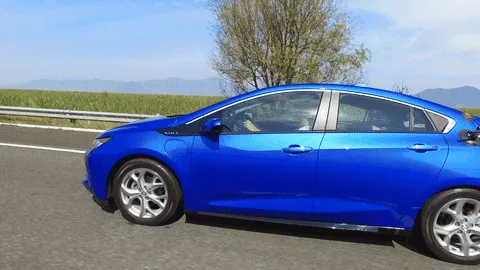John Hearne reports on soaring sales of electric cars in Ireland, where drivers are engaging with the planet’s dwindling reserves of fossil fuels
Sales of electric cars have gone through the roof. In the first two months of 2019, 1,129 electric vehicles (EVs) were registered. That’s almost as many as the total number registered in 2018. What’s more, these increases come in the face of a car market that’s actually in decline. The overall number of car sales has decreased by 12.2% compared to last year.
Despite this leap in ownership, the overall take-up of EVs in Ireland remains very low. Eurostat, the European statistics agency says that last April — the most recent date for which we have figures — there were 26,220 cars in Ireland running on alternative energy. This is only around 1% of the total number of cars on the road.
The central issue with electric cars is, of course, cost. A Nissan Leaf starts at €33,690 new, while a Hyundai Iconiq comes in at €39,896.
A VW eGolf will set you back €49,495, while up at the premium end of the market, an Audi E-Tron costs just over €101,000 and a Tesla Model X, €130,872.

Second hand models are significantly cheaper, but the technology is moving so rapidly that you may find yourself constrained by driving range or charging times if you opt for an older model.
The good news is that there’s significant grant aid available to consumers from government to incentivise EV ownership.
The actual size of the grant is dependent on the cost of the car, and ranges from €2,000 for a list price of between €14,000 and €15,000, up to €5,000 for a car costing more than €20,000.
These rates apply to cars purchased privately and are available for battery electric vehicles (BEV) and plugin hybrid electric vehicles (PHEV). There is no grant aid for second hand electric cars.
There are also significant derogations from Vehicle Registration Tax (VRT). Plugin hybrids can avail of a rebate of €2,500 while fully electric cars can get back as much as €5,000.
All told, many electric cars can avail of a total government grant of €10,000.
Because the dealer can apply directly for these incentives, the advertised price of electric cars is frequently inclusive of the full rebate.

The cost incentives don’t stop there. If your employer buys you a fully electric car (not a hybrid) as part of your remuneration package, you can avail of an exemption in benefit in kind (BIK). In other words, you don’t have to pay income tax on the value of the car.
Again, note that this exemption doesn’t apply to hybrids and as it currently stands, the scheme is due to end in December 2021.
Also, the scheme is capped at €50,000.
So if your employer buys you a car below this value, you qualify for full relief.
Moreover, while you benefit by the absence of BIK, your employer also dodges the 10.95% employer’s PRSI that is normally liable.
The big advantage of running an electric vehicle is of course the fact that running costs range from not much to nothing at all.
The ESB runs a network of free charging stations, of which there are currently in excess of 1,000 all around the country, together with 70 fast-charging stations which allow you — as the name suggests — to charge your car much more quickly than the standard charging points.

You can also install an electric vehicle home charger. The Sustainable Energy Authority of Ireland (SEAI) offers grants of up to €600 towards the cost of installation, and that typically covers 70% of the total outlay. According to the ESB, a full overnight charge will cost you no more than €2 — using cheaper night-rate electricity.
To dive a little deeper into running costs, driving a Nissan Leaf 150 Km per week will cost you €1.90, compared to €16.20 for an equivalent petrol car and €11.81 with an equivalent diesel. And because electric engines have fewer moving parts, servicing is also significantly cheaper than servicing a standard petrol or diesel car.
Motor tax is also much cheaper — no more than €120 per year, while toll operators are also throwing in an incentive. If you drive a hybrid or a fully electric vehicle, you can get a discount of up to 75% on the M50 and 50% on all other roads.
Following the introduction of the 0% BIK for EVs under €50,000, would-be electric car owners have been running into difficulties with insurance.
Jonathan Hehir is MD of insuremycars.ie. He says that up until now, if an individual with their own business sold their own car so that their business could then provide them with a company electric-car, they had to take out a brand-new insurance policy through the company — with zero no claims bonus.
“So for example, where their private car motor insurance policy may have been €400 per annum, it had suddenly risen to €800 or more. However, after months of negotiation, we have now struck a deal with two insurers whereby they will allow the existing private car policy of a business-owner to be used for their new company electric car.

“Getting motorists to even consider migrating over to something as new as e-motoring involves communicating the benefits of these cars, not just to the environment but to people themselves. For most people, affordability is the primary consideration — they have to see a financial incentive. For this reason, we have also negotiated a special discount of between 8% and 12% for electric car drivers, making premiums for electric cars significantly cheaper than petrol or diesel cars.”
Given this breakthrough, along with the range of other incentives, to say nothing of the environmental impact of substituting away from fossil fuelled cars, why is it that we’re not all driving EVs?
Recent research from the AA found that a fear of running out of power while driving an electric vehicle is one of the main factors holding motorists back from replacing their diesel or petrol powered car.

In response to a survey of over 3,000 motorists, 48.41% of respondents agreed that concerns about the current effective driving range of most electric vehicles meant they were unlikely to consider purchasing an EV. The survey also found that 12.46% of those surveyed identified a lack of EV charging points on routes across the country as a contributing factor to their reluctance.
Conor Faughnan of the AA points out that in a relatively short space of time, electric vehicles have undergone their own version of the kind of evolution we have seen with mobile phones.
“When the technology first emerged, we were talking about cars with very limited mileage range and a real lack of supporting infrastructure in Ireland. However, with the modern EV, the effective mileage range is, broadly speaking, more than enough to meet the driving needs of a typical Irish motorist. While we may not yet be at the stage of having an affordable EV which could get you from one end of Ireland to the other and back on a single charge, for your average driver who uses their car to commute from home to work or down to the shops, an electric vehicle is a perfectly suitable option.”
— Jonathan Hehir is MD of insuremycars.ie






